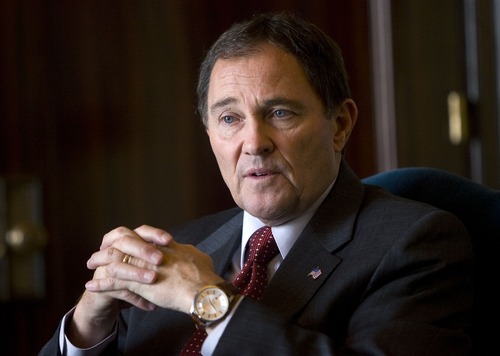This is an archived article that was published on sltrib.com in 2012, and information in the article may be outdated. It is provided only for personal research purposes and may not be reprinted.
Gov. Gary Herbert said Thursday that federal mandates have driven a billion-dollar increase in federal spending in Utah and are tying the state's hands.
In his State of the State address Wednesday night, Herbert decried "the regulatory colossus created by an overreaching, out-of-control and out-of-touch federal government."
"Be assured," he said, "that this governor is firmly resolved to fortify our state as a bulwark against federal overreach."
But since Herbert took office, federal funding in Utah has grown by more than $1 billion.
In Gov. Jon Huntsman's final budget proposal, federal funds made up 23.4 percent of the Utah budget. In Herbert's proposal for the coming fiscal year, that figure has jumped to 27.7 percent — a total of more than $3.5 billion.
"The federal government is mandating that we do things we ought not be doing," Herbert said during his monthly news conference at KUED. "We put the money out there, and we have to pay the bills. My criticism is we have to get the federal government to control themselves."
But at least one conservative challenger to Herbert says the governor isn't helpless when it comes to accepting federal money.
"I guess we can keep doing this until we're bankrupt, but there certainly are opportunities out there" to curb the federal spending, said state Rep. Ken Sumsion, R-American Fork, who is seeking the GOP gubernatorial nomination.
Sumsion said, if elected, he would reject federal money for any new program and try to cut back federal dollars over time.
Herbert said it was "unconscionable" that the Obama administration didn't consult governors on federal health reform, which he called "probably the most egregious example of federal overreach."
As a result, Herbert said growth in Medicaid, which provides health care to low-income Utahns, will increase that program's spending in Utah by $1.3 billion in the coming decade.
Most of that funding comes from the federal government, which often matches each state dollar with three federal dollars.
"So, yeah, we've had some increases in money in the budget because of the mandates that come out of Washington, D.C., and this effort to have a partnership," Herbert said. "But we will wean ourselves off of it. We will live within our means and as the federal government balances their budget — and I hope they do — we will make those critical adjustments as we do what we need to do here in the state."
But Sumsion said that there is nothing that forces the state accept the federal money for Medicaid.
"We say it's mandated. That really isn't true, because we've opted into that program and because we took the money we have to live by those rules," he said.
On another front, Herbert also said he sees no hypocrisy in taking disaster aid from the Federal Emergency Management Agency.
During his speech, Herbert pointed to Utah's response to violent windstorms that toppled thousands of trees as a show of the state's self-sufficiency. But the state is seeking more than $4 million in federal disaster relief from the damages.
Last week, the state received $60 million in federal agricultural disaster relief, the most of any state, as a result of last year's flooding.
"That's our money," he said. "We put money in the federal government like all states that pay taxes. … As we put money in, we're going to get money back."



